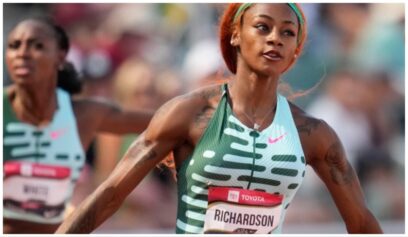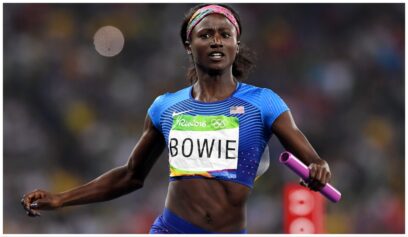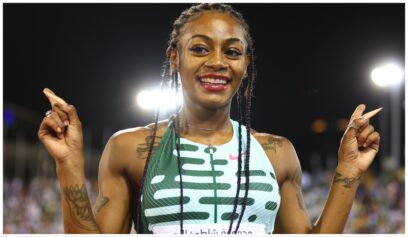The South African runner is proof that the black woman is the most disrespected person on Earth.
Caster Semenya just wants to compete.
And despite the fact that the long sprinter and middle-distance runner doesn’t have to leap over hurdles on the track, she still has to deal with them off the field.
That’s what happens when you’re a queer black woman, or as I like to call it, a triple minority.
Because if you don’t think that Semenya’s race, gender, and sexual orientation have anything to do with the Court of Arbitration for Sport’s decision from earlier this week that orders the two-time Olympic champion to take testosterone-suppressing medication just to compete, then you’re either one of two things: a damn fool or cruelly inhumane.
“The most disrespected person in America is the black woman. The most unprotected person in America is the black woman. The most neglected person in America is the black woman,” said Malcom X in 1962. And while Semenya is South African, the rule still applies.
History has given us far too many examples of this notion, whether it be in everyday life or sports.
Ask Serena Williams if her life would be different if she were “nicer,” wasn’t as physically imposing, or wasn’t married to a white man. But when you’re a black woman who dominates your sport, or profession, and are unapologetic about who you are and who you love, things like this happen.
So much for progress.
After Semenya appealed the International Association of Athletics Federations ruling to the court, she lost by a 2-1 margin from a panel of three arbitrators. It is believed that Semenya has an intersex condition that causes her higher levels of testosterone.
She’s being criminalized for her DNA.
Semenya isn’t transgender. She’s just something that her sport hasn’t seen before.
Other sports have dealt with transcendent athletes before and decided to change some of the rules.
In basketball, they widened the lane for George Mikan and banned dunking for a while because of Lew Alcindor. The game eventually evolved, players adapted, and progress was made.
So when Zion Williamson showed up last season in college basketball he was put on a pedestal, not told to “lean out,” or not jump as high.
In baseball, Ed Walsh’s spitball was so good in the early 1900’s that they outlawed it. In golf, Augusta National has gone through multiple changes to Tiger Woods-proof their course.
But in all of those cases, each athlete, which were all men, still went on to use their God-given abilities to dominate their respective sports, despite the rules that had been put in place in the name of “fairness.”
However, none of them were forced to take medication to limit their abilities.
Why?
Because the rules don’t apply when you’re an elite queer black woman.
https://www.youtube.com/watch?v=6UW-VgxlIZI
“It is out of our control and we rely on people at the top sorting it out,” said British runner Lynsey Sharp after she got roasted by Semenya in the 2016 Olympics, finishing sixth. “The public can see how difficult it is with the change of rule, but all we can do is give it our best.”
After the race, Sharp hugged Melissa Bishop (Canada) and Joanna Jozwik (Poland) on the track as they shed their white girl tears enraged with jealousy and anger after losing to Semenya.
“We see each other week in and week out, so we know how each other feel,” Sharp explained.
So much for “girl power.”
“Caster is fighting for something beyond just track and field athletics — she is fighting for women in sports, in society and I respect her for that,” said South African Olympic 400-meter champion Wayde van Niekerk recently.
“I support the hard work and talent she has put into the sport. With what she believes in and what she is dreaming of, I have got a lot of respect for her. I hope and pray that everything just goes from strength to strength for her.”
The craziest thing about this situation is that even when you eliminate the misogyny, racism, and homophobia, the idea of this ruling still doesn’t make sense.
The Court of Arbitration for Sport has already admitted that they’re discriminating against Semenya.
“The Panel found that the DSD Regulations are discriminatory but the majority of the Panel found that, on the basis of the evidence submitted by the parties, such discrimination is a necessary, reasonable and proportionate means of achieving the IAAF’s aim of preserving the integrity of female athletics in the Restricted Events,” they wrote in their release.
They even admitted that taking unnecessary medication isn’t the smartest thing to do.
“The side effects of hormonal treatment, experienced by individual athletes could, with further evidence, demonstrate the practical impossibility of compliance which could, in turn, lead to a different conclusion as to the proportionality of the DSD Regulations.”
Back when Michael Phelps was winning every swim meet he competed in, all we ever heard about was how had the perfect body for the sport. And during the first round of the NBA playoffs, we saw how 7’3” big man Boban Marjanovic could dunk on defenders without even jumping.
Body types have always been a thing in sports. ESPN The Magazine even has an annual edition dedicated to them. However, that conversation seems to always change when black women are involved.
But, it’s nothing we haven’t seen before.
Malcolm put us up on game decades ago. And almost sixty years later, Caster Semenya is living proof that his words still reign true.



